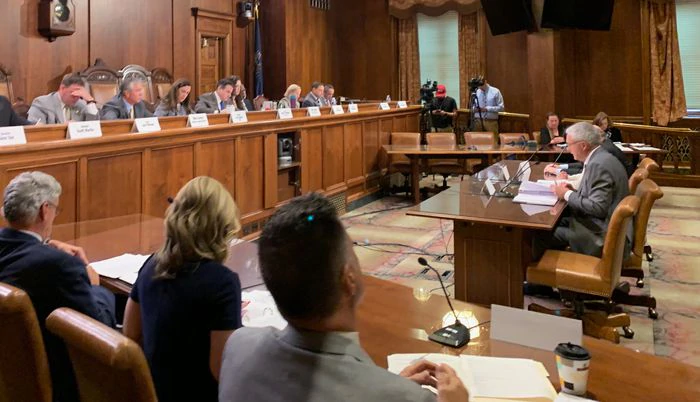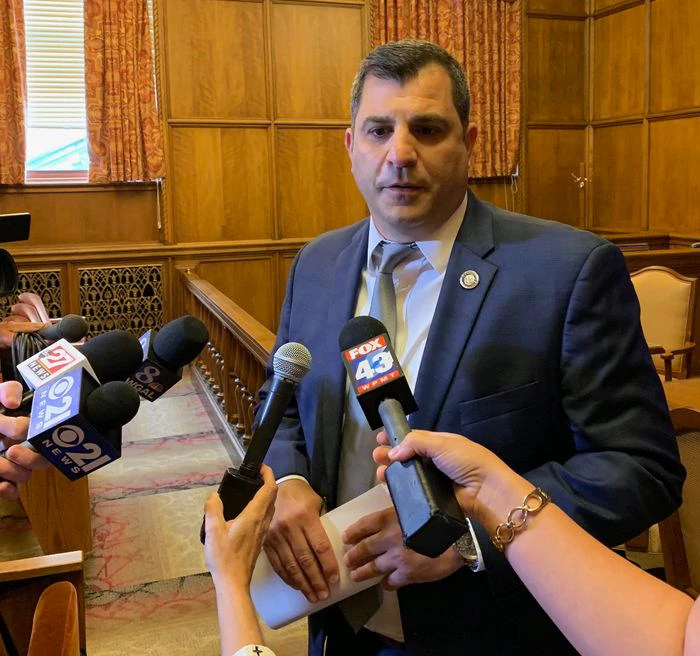Survivors’ Stories ‘made an Impact’ on Senators Weighing Changes to Pa.'s Statutes of Limitations
By Jan Murphy
Sexual abuse survivors and advocates pushing for reforms to Pennsylvania’s statute of limitations on sexual abuse claims for over a decade are tired of waiting. They want action. They made that clear in their testimony offered at a state Senate Judiciary Committee hearing on the issue on Wednesday. Offering their personal stories of abuse in emotion-packed testimony, they implored senators to have the courage to make those reforms. As the daylong hearing neared its end from at-times tearful survivors, committee Chairwoman Lisa Baker, R-Luzerne County, made no promises to them about what the committee will do. “But I can promise you have made an impact,” Baker said, to one panel of survivors following their testimony about their encounters with sexually abused by a doctor, a friend and clergy. Baker promised as the committee decides its path forward on this issue that it would review and reflect on not only what the abuse victims told the senators but also what other experts with different views had to say. After the hearing ended, Baker declined comment except to say she needed time to process the day’s testimony. But Sen. Larry Farnese, D-Philadelphia, who was moved by the survivors’ stories, said after hearing their testimony, “I just don’t understand how someone could come to a different view that there doesn’t have to be something done right now immediately. We need to act.” On this issue, all eyes now rest on the Senate. The state House of Representatives has been the only chamber that has acted on legislation addressing this issue in the wake of last year’s scathing grand jury report about clergy sex abuse and the concealment of thousands of children at the hands of more than 300 clergy across six dioceses in the state, including the Diocese of Harrisburg. In its report, the grand jury outlined four concrete recommendations: The elimination of criminal statutes for child sex abuse Creation of a two-year civil window The enactment of new laws that specify that confidentiality agreements do not cover conversations with law enforcement The clarification of penalties for continuing failure to report child sex abuse The House last spring passed House Bill 962, which eliminated the criminal statute of limitations for child sexual abuse crimes going forward and raised the age to 55 for future victims of abuse to file civil lawsuits against their abuser. Currently, victims have until until age 50 to file criminal claims and age 30 to pursue civil lawsuits. The other bill, House Bill 963, proposed an amendment to the remedies clause in the state constitution, which would pave the way for a retroactive window for victims who are time-barred from making civil claims. Going the amendment route was proposed to address majority Senate Republican arguments that such a retroactive window is unconstitutional. Some Democratic senators have since offered Senate Bill 540, which would lift the statute of limitations for children and adults who were sexually abused at any age and offer a two-year retroactive window to allow time-barred victims to file civil suits. At the hearing’s outset, Baker made it clear that the hearing was not intended to decide the fate of any of those bills but to weigh the benefits and drawbacks of each. Some experts spoke of the victims’ compensation funds of the church as a better alternative to litigation for abuse claims to be settled, but Marci Hamllton, CEO and academic director of Child USA, said the problem with those programs is “no truth comes out.” Hamilton outright dismisses the notion that a retroactive window is unconstitutional and points to the number of states that have opened them as proof. She said if the goal is to pull back the curtain “to find out who the perpetrators are in the state and who are the institutions who are aiding and abetting them, we need a real window” that allows time-barred victims to go after their abusers. Sam Marshall, president and CEO of the Insurance Federation of Pennsylvania, said his industry strongly supports prospective reforms to the child sexual abuse laws to ensure abuses of the past don’t happen again. But it can’t support reforms that apply retroactively. “We don’t oppose this because we’re trying to cover up or seeking to escape our own culpability as the insurance industry,” Marshall said. Rather, he said they oppose it because besides the question of a retroactive window’s legality, “it is retroactively creating liability without retroactively allowing for a premium. Insurance covers risk for which an insurer is able to calculate and charge a premium. Retroactive liability doesn’t allow for the second part of that equation.” Brian Wenger, a former lawyer for the Archdiocese of St. Paul and Minneapolis, shared the Twin Cities’ experience when a retroactive window opened there. It led to the archdiocese filing for bankruptcy after receiving 450 claims to its victims’ compensation fund. That in turn led to staff cuts, a wage freeze, a 20 percent reduction in its overall spending, dipping into funds set aside to declare a church a national historic monument and funds for its medical plan to pay the victims, he said. Further, the social services the archdiocese was able to provide to that community’s homeless and hungry got trimmed. Sen. Art Haywood, D-Philadelphia, asked Wenger whether he was suggesting that abuse victims should accept their suffering so the archdiocese could finance its operations. Wenger replied that based on Minnesota’s experience, “I believe that there is a better way to address the harm to the victims than through litigation and opening of a window.”
Rep. Mark Rozzi, a clergy sex survivor and author of one of the House bills dealing with this issue, was infuriated with Wenger’s comments. “If for some reason the diocese goes bankrupt or they have to eliminate 20 percent of their workforce, so be it. Victims are out there suffering every single day,” Rozzi, D-Berks County, said “We live with the constant nightmares over and over in their lives and they’re worried about a 20 percent cut to the workforce or they might have social programs that might have to be cut?” Representatives from administrators of some Catholic church victims compensation programs told the panel that as of Sunday, one day before the Sept. 30 cutoff for claims, 1,255 victims in the Philadelphia, Scranton, Erie, Pittsburgh and Allentown diocese were paid awards totaling more than $53.2 million. The Harrisburg Diocese paid out $12 million in settlement to 106 victims. But Rozzi and individuals who testified at the hearing pointed out that clergy sexual abuse survivors account for just 4 percent of victims. The remainder are victims of teachers, doctors, coaches, family members, neighbors and others for which no compensation fund is available to file a claim and that’s another reason why reforms are needed. He and other survivors pointed out repeatedly throughout the hearing that money is not what they are after. They want justice for the pain and suffering they have lived with and an opportunity to hold their abuser accountable. Sarah Brooks, a survivor herself whose abuser was prosecuted, spoke of the satisfaction she felt when she got her day in court. She saw her abuser, a family friend that she knew through her church, being walked away in handcuffs and she was able to “close that painful chapter of my life and move on into a healthier and happier one.” Still, she said it’s heart-wrenching for her to know that other survivors she has met along the way are denied that healing because “of a disgusting law.” To the senators, she said, “there is no middle ground, and you either protect children or protect pedophiles. Which side will you stand on?” Jan Murphy may be reached at jmurphy@pennlive.com. Follow her on Twitter at @JanMurphy.
|
.
Any original material on these pages is copyright © BishopAccountability.org 2004. Reproduce freely with attribution.

